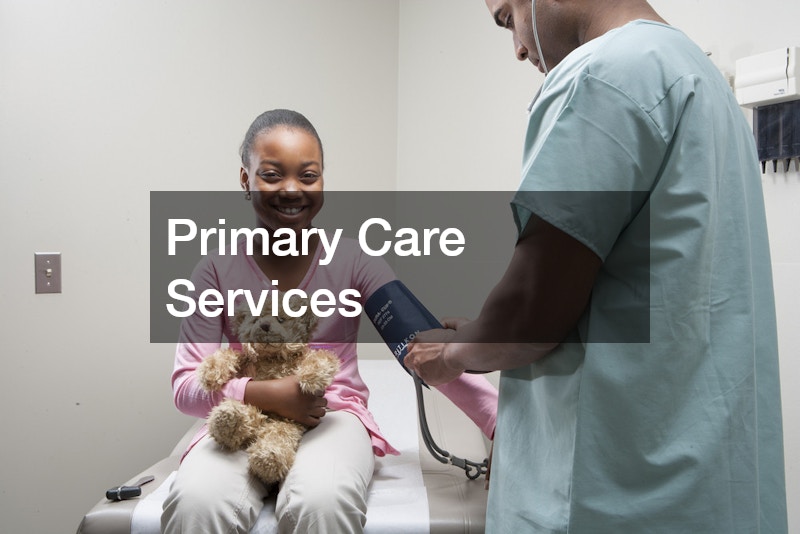When it comes to navigating the world of health insurance, understanding the different types of essential healthcare services can help you make informed decisions about your medical care. Insurance coverage can vary widely, so knowing what kinds of services are often included in healthcare plans can save you money in the long run. In this article, we will explore 10 healthcare services your insurance may cover, providing insight into their importance and potential costs. By familiarizing yourself with these services, you can ensure that you maximize your benefits and receive the best possible care.

1. Primary Care Services
Primary care services are fundamental to maintaining overall health. These services typically involve routine check-ups, health screenings, and preventive care, all of which are essential healthcare services designed to catch illnesses early. Insurance plans usually cover these visits, making it crucial to establish a relationship with a primary care physician. Regular engagement with a primary care provider fosters continuity of care, enabling doctors to track changes in health over time and intervene as necessary.
During these appointments, doctors can identify risk factors for chronic diseases and recommend lifestyle modifications. They can also provide referrals to specialists if needed, ensuring comprehensive healthcare. By prioritizing primary care, individuals can enjoy better health outcomes and more tailored medical interventions when necessary. In addition, primary care physicians play a key role in coordinating overall healthcare, ensuring patients receive appropriate follow-ups and necessary screenings.
Regular visits to your primary care provider can also lead to lower healthcare costs in the long term. Preventive care can avoid costly visits to urgent care clinics and emergency rooms, which can be financially draining without insurance. Thus, recognizing the importance of primary care within the scope of healthcare services is vital. A strong primary care foundation helps in managing chronic conditions more effectively, reducing hospitalizations and improving overall well-being.
2. Emergency and Urgent Care Services
Emergency rooms and urgent care clinics are essential healthcare services that cater to acute medical issues needing immediate attention. While emergency rooms handle life-threatening situations, urgent care clinics offer care for less severe conditions, providing a more cost-effective and timely solution. Understanding when to use each service can greatly enhance your healthcare experience. Making the right choice between the two can lead to quicker treatment and help avoid unnecessary expenses.
Typically, insurance plans cover both types of services, but your out-of-pocket costs may vary. Urgent care clinics often have shorter wait times and lower copays compared to emergency rooms, which can be beneficial for both your health and finances. Navigating these options effectively ensures that you receive appropriate medical care while managing costs. Some insurers also provide telehealth options, allowing you to consult a physician remotely before deciding whether an in-person visit is necessary.
In situations requiring imaging, healthcare providers might use advanced technologies such as an upright MRI scanner. This tool allows for a different positioning of the patient during scans, enhancing diagnostic accuracy. Such technology is frequently included in insurance coverage, reflecting the vast array of essential healthcare services available to individuals. With advances in medical technology, insurance plans increasingly cover a variety of diagnostic tools to ensure better and faster diagnoses.

3. Mental Health Services
Mental health services represent a crucial aspect of healthcare services, focusing on emotional and psychological well-being. Coverage for mental health services varies by plan, but many offer therapy sessions, counseling, and medication management. Access to these services is vital, especially in today’s fast-paced world. Increased awareness of mental health has led to expanded coverage, ensuring more individuals can receive the care they need.
One popular form of therapy is TMS therapy services, which are non-invasive treatments for depression and other mood disorders. Insurance plans are increasingly recognizing the importance of mental health by covering such innovative treatments. This reflects a broader understanding that mental health is as important as physical health. Many plans now also include coverage for virtual therapy sessions, making mental health care more accessible than ever before.
Furthermore, ongoing mental health support can help prevent more severe issues, ultimately reducing long-term healthcare costs. Just as with physical conditions, addressing mental health needs early can provide better outcomes. Thus, ensuring you have coverage for a range of mental health services is an investment in your overall well-being. Mental health services not only benefit individuals but also contribute to overall workplace productivity and improved quality of life.
4. Preventive Care Services
Preventive care services are key to avoiding potential health issues before they become significant concerns. This category includes vaccinations, screenings (like mammograms and colonoscopies), and wellness check-ups. Most insurance providers fully cover these essential healthcare services, emphasizing the importance of preventive measures. Investing in preventive care not only protects your long-term health but also reduces the financial strain of treating conditions that could have been prevented.
By being proactive, individuals can detect and address health issues at an earlier stage, which boosts treatment effectiveness and reduces costs. The average cost of surrogacy can be significantly influenced by the health of all parties involved, hence the critical importance of preventive care. Regular check-ups provide information that can lead to more informed decisions about family planning and other health-related choices. Additionally, many preventive services include personalized health coaching, helping individuals develop healthier lifestyle habits.
Additionally, preventive services often include screenings for chronic conditions such as diabetes and hypertension. Early detection of these conditions can significantly improve quality of life and reduce healthcare expenses. Thus, utilizing preventive care services aligns with the broader goal of essential healthcare services to maintain public health and decrease future medical costs. Many insurance plans also offer wellness incentives, rewarding members for engaging in healthy activities such as exercise and nutrition programs, which may include services such as IV therapy service  at your local med spa.
at your local med spa.

5. Prescription Drug Coverage
Prescription drug coverage is a vital aspect of health insurance that can help manage various health conditions. Most plans offer benefits for both essential and specialty medications, ensuring patients can access the drugs they need without exorbitant costs. This is especially important for chronic conditions requiring ongoing treatment. Without adequate coverage, prescription costs can quickly become a financial burden for individuals managing long-term health conditions.
Understanding the intricacies of your prescription drug coverage can help you navigate what medications are included and how copays are structured. Some healthcare services include medication management programs to help patients adhere to their prescriptions and avoid hospitalizations. Moreover, consult with personalized pharmacists who can help navigate drug interactions and alternatives. Many insurance providers also offer mail-order pharmacy services, making it more convenient to obtain necessary medications.
The negotiation of drug prices and availability also falls under the purview of personal injury lawyers, should complications from medical treatment arise. Having thorough knowledge about your plan can aid in avoiding unexpected expenses related to your prescriptions, making it a critical area of focus within healthcare services. Overall, effective management of prescription drug costs can enhance quality of life for many individuals. Exploring generic drug options can also help reduce expenses while ensuring access to necessary treatments.
6. Rehabilitation Services
Rehabilitation services are essential healthcare services aimed at helping individuals regain independence and functionality after injuries or surgeries. This category includes physical therapy, occupational therapy, and speech therapy. These services are often covered by health insurance, which can ease the financial burden during recovery.
Local neuro rehab facilities specialize in helping patients recover from neurological impairments, focusing on therapies that treat balance, coordination, and speech issues. Insurance coverage for these specialized services indicates a growing acknowledgment of comprehensive recovery needs following serious health events. Engaging with rehabilitation services can significantly enhance recovery speed and quality of life.
Additionally, integrating rehabilitation services with preventative care ensures a holistic approach to health. Individuals who receive proper rehab often experience fewer long-term complications and reduced risk of re-injury. Understanding the full spectrum of rehabilitative services can aid in making more informed health choices and leveraging insurance benefits effectively.

7. Maternity and Newborn Care
Maternity and newborn care are essential healthcare services that ensure the health and safety of mothers and their babies. Most health insurance plans cover a variety of services, including prenatal visits, labor and delivery costs, and postnatal care. Such coverage can significantly alleviate the financial stress associated with childbirth.
The average cost of surrogacy can be daunting, making insurance coverage even more critical. Prospective parents should take the time to understand their insurance options and benefits relating to maternity care. Recognizing what your plan includes can help in budgeting for medical costs and managing finances effectively.
In addition to traditional maternity services, plans increasingly cover support for mental health during and after pregnancy, highlighting the emerging understanding of maternal mental health. Comprehensive support during pregnancy ensures better outcomes for both mother and child. Consequently, having robust maternity coverage is essential for new parents navigating this significant life event.
8. Dental Services
Dental services are another category often included in health insurance plans, though they might require separate coverage. Regular dental checkups are healthcare services that can help prevent oral diseases and maintain overall health. Many plans offer varying levels of coverage for cleanings, exams, and necessary procedures.
In recognizing the connection between dental and overall health, insurance providers have begun to include more comprehensive dental coverage. Regular oral health checkups can help identify issues early and prevent complications. This is particularly important as research continues to show links between poor oral health and various systemic conditions.
Engaging with a plastic surgeon for cosmetic dental improvements is another area some policies may cover as part of dental services. Investing in quality dental care now can provide long-term savings by reducing the need for extensive treatments in the future. Thus, understanding your dental coverage is essential for maintaining optimal oral health.
9. Vision Services
Vision services, including routine eye exams and corrective lenses, are often part of essential healthcare services. Many insurance plans offer partial coverage for eye exams, glasses, and contact lenses, ensuring that individuals maintain good vision. Regular eye exams can also detect other underlying health issues, making them critical for overall health maintenance.
Some plans include coverage for surgical procedures, such as LASIK, which can significantly enhance quality of life for individuals with refractive errors. Understanding your vision service coverage can lead to better long-term health outcomes, as many eye conditions can lead to significant complications if left unchecked. Early detection through regular exams can allow for timely intervention, ultimately safeguarding eyesight.
In addition, the integration of advanced technologies in vision correction, such as hearing devices for those with auditory issues, reflects the surge in innovative therapies available through insurance. By covering a wide range of essential healthcare services, insurers are recognizing the diverse needs of patients. Ultimately, understanding the breadth of these services is essential for fully leveraging health insurance benefits.
10. Specialty Services
Specialty services refer to the advanced care options available for various health conditions, often requiring referral from a primary care provider. These healthcare services encompass a range of specialties, from cardiology to dermatology, and can significantly enhance patient care. Most insurance plans offer coverage for consultations and treatments, making these services accessible to patients.
As health conditions become more complex, specialty care becomes increasingly vital. For example, a patient requiring a complex surgical procedure may seek the expertise of a plastic surgeon to achieve the best results. Insurance policies are adapting to accommodate such needs, showcasing the importance of specialty services within the healthcare system.
Accessing specialty services often involves careful coordination to align with insurance requirements. Engaging with personal injury lawyers may be necessary if treatment arises due to an accident, demonstrating how specialty services are interconnected with legal and financial aspects of healthcare. Overall, understanding the range of specialty services can empower individuals to seek the appropriate care they need.
Understanding essential healthcare services is crucial to navigating the complexities of health insurance. From preventive care to specialty services, being knowledgeable about what is covered can save individuals time and money. By leveraging available benefits wisely, individuals can prioritize their health and access the necessary medical interventions.
Investing in your health through proactive care and understanding your insurance coverage can significantly enhance your overall well-being. Whether it’s regular dental checkups or mental health services, the coverage options available today allow for comprehensive and accessible care in a variety of settings. By exploring these essential healthcare services, you are better positioned to make informed healthcare choices.
